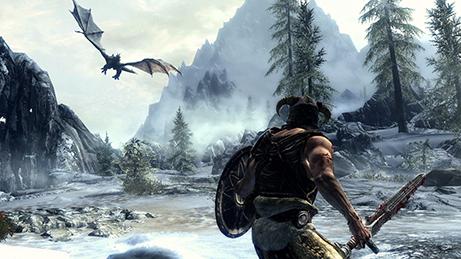No consequences make an open-world game feel fake

MCT
Taking a cue from “Fallout 3,” Bethesda added cinematic, slow-motion finishing moves to the combat in “The Elder Scrolls V: Skyrim.”
November 28, 2012
Some of the most popular games on the market are open world games – where the player can go wherever he or she wants and their choices impact the events in the game world, either through gameplay or story. This is not to be confused with sandbox games like “Minecraft,” where the player has the power to mold the game world as they please.
One prominent feature touted in open-world games is how the player’s decisions make an impact on the game world in general. It’s disappointing, then, that the choices in a vast majority of games marketed like this are as shallow as an MTV reality show.
Bethesda’s “Elder Scrolls V: Skyrim” is an excellent example of this phenomenon. The in-game map is gigantic, and the player is allowed to walk nearly everywhere. There is a plethora of quests the player can complete, and a significant portion of these quests involve choices made by the player.
For example, early in the game, the player must choose between joining the Empire or the rebels, known as Stormcloaks, who are trying to boot the Empire from Skyrim. It would be reasonable to think the game would dramatically change if the Stormcloaks succeeded. However (this is a bit of a spoiler), both branches end with the leader of the opposing faction dead and all the non-player characters treating the player the same as always, even though the player was a factor in their chosen side’s victory.
There is a chance those two quest lines are meant to be metaphors on rebellion and government in general, implying that nothing changes regardless of who is in power. That interpretation is hampered somewhat when viewed in light of the Thieves’ Guild quest line. Near the end of the quest, the player must return a key to the altar of the god the guild follows. If the key is not returned, the god will not protect the guild and the guild will dissolve. This never happens even if the player chooses to keep the key indefinitely and not complete the quest.
Most of the quests in “Skyrim” behave like this; the choices made in the story are not reflected in the gameplay. This is a game where such quests are supposed to impact the game world. Yet, even though they make little impact, the choices in “Skyrim” make far more impact than choices in other open-world games.
Treyarch’s “Spider-Man 2,” one of the only high-quality video games based off a movie franchise, and Avalanche Studios’ “Just Cause 2” are much more typical open-world games. Both plots are extremely linear, with little wiggle-room for the player to alter their paths, but movement within each game’s map is mostly unlimited.
A main feature of both games is that the player can kill an unlimited amount of criminals in “Spider-Man” and enemy soldiers in “Just Cause.” Yet, both games only nominally increase the hostility of both sets of enemies regardless of how many are killed. While limiting the maximum amount of enemies defeated would limit the replay value of the games, it stands to reason the player would be recognized on sight after annihilating just five people, much less the hundreds that are actually killed throughout the game.
Open-world games are inherently filled with choices based on where the player goes and who is killed. These choices hardly matter, even though it would be relatively simple for developers to include consequences
If a few extra lines of dialogue were recorded and if the enemies were programmed to become progressively more hostile as more of their allies were killed, the gameplay would reflect the player’s influence on the game world. While the dialogue would slightly increase the budget for the game, it probably would not make much of a difference, especially for a successful game. The extra programming would likely not add any significant expense to the developers.
Adding such features would make open-world games that much more engaging. If the video game industry can create a device that can track someone’s movement with no controllers, then there’s no excuse for not adding some impact to in-game decisions.
Nick can be reached at: scheuer@csus.edu
































































































































